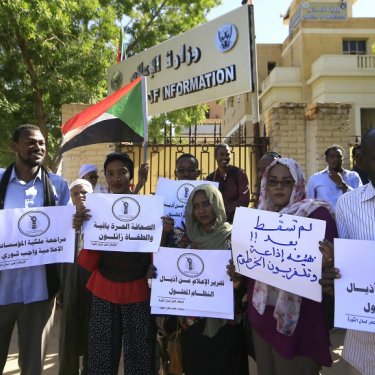Sudan : Press freedom still in transition a year after Omar al-Bashir’s removal

The persecution of journalists and media outlets critical of Sudan’s former regime officially ended with the installation of a civilian-led government, but the media are still devastated by three decades of censorship and harassment, and the long-awaited changes have yet to materialize. Reporters Without Borders (RSF) urges the interim authorities to do what is necessary to ensure that press freedom can become a reality in Sudan.
“No journalist in the new Sudan will be subjected to repression or imprisonment.” Abdalla Hamdok, the prime minister heading Sudan’s transitional government, promised at the United Nations General Assembly last September, and on the whole that promise has been kept. On the first anniversary of President Omar al-Bashir’s ouster on 11 April 2019, after a four-month-long popular uprising, the new authorities have gradually wound down the systematic harassment of the media and journalists that prevailed during Bashir’s 30 years of dictatorial rule. At the height of the uprising, RSF registered more than 100 press freedom violations, mainly arrests of journalists and various forms of newspaper censorship.
The National Intelligence and Security Service (NISS) no longer raids newspapers or their printing presses to control the content of their articles or to confiscate entire issues as they come off the press. Institutional censorship has declined dramatically without disappearing altogether. News control is now exercised more insidiously, sometime from within newsrooms, as was seen with Lubna Abdella’s dismissal by the newspaper Al Sudani Al Dawlia after an investigative story about corruption within the human rights commission. “Most of the 18 daily newspapers that cover politics continue to be affiliated or close to supporters of the former regime and economic condition prevent the arrival of new actors,” said Hassan Ahmed Berkia, a member of the executive secretariat of the Sudanese Journalists Network (SJN). Around 300 journalists demonstrated outside the information ministry in December to demand changes at the top of the public broadcaster SRTC and the removal of the intelligence agents who were infiltrated into many news organizations.
The interests of the former regime and its allies are defended online and on messaging services by the Cyber Jihadist Unit, a troll army that the intelligence services created after the Arab Spring in 2011 to spy on the opposition and journalists. It pumps out disinformation designed to defend former regime figures and has been included in RSF’s list of Digital Predators of Press Freedom.
“The end of the mass arrests and censorship is a major advance in a country used to spending year after year near the bottom of the World Press Freedom Index,” said Arnaud Froger, the head of RSF’s Africa desk. “The conditions for free and independent quality journalism are nonetheless far from being met. There will be no real media pluralism unless the authorities allow new actors to emerge in a media landscape still dominated by the former regime’s allies. Legislative reforms that allow more freedom, protect the press and prevent the security services from acting as an editorial police that spreads propaganda and gags critical media must be carried out without delay and in an inclusive manner, with Sudan’s media and journalists”.
The authorities have let it be known that they are drafting legislation but they have not consulted the media outlets and journalists’ organizations that were most critical of the former regime. The 2007 cyber-crime law, the 2009 press law and the 2010 national security law are all still in effect and continue to pose a major threat to journalism in Sudan.
Sudan is ranked 175th out of 180 countries in RSF’s 2019 World Press Freedom Index.



